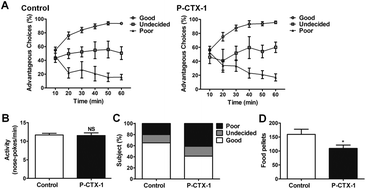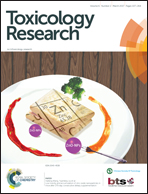Chronic ciguatoxin poisoning causes emotional and cognitive dysfunctions in rats
Abstract
Ciguatoxins are marine biotoxins that induce the human poisoning syndrome known as ciguatera fish poisoning (CFP). In humans, different kinds of neurological symptoms have been reported after CFP, including anxiety, depression and memory loss. Repetitive exposures to sub-threshold levels of ciguatera toxins may cause irreversible sub-clinical damage, and eventually cause more severe illness. Our previous study has shown that an acute single dose of Pacific ciguatoxin-1 (P-CTX-1) induced synaptic facilitation and blockage of the induction of electrical stimulation-induced long-term potentiation in the medial thalamus–anterior cingulate cortex pathway. Reactive astrogliosis was detected in acute ciguatera poisoning. Despite the reports of complex and prolonged neurological symptoms in patients, few studies have been conducted in animal models to investigate the emotional and cognitive deficits after chronic exposure to ciguatoxin. In the present study, using a rat model with repeated exposures to low dosage of P-CTX-1, we observed development of anxiety-like behavior by open field test and elevated plus maze test, and learning and memory deficits by the Morris water maze; further, decision-making impairment was determined in the chronic P-CTX-1-treated rats by the rats gambling task. We conclude that chronic ciguatera poisoning leads to anxiety, and to impairment of spatial reference memory and decision-making behavior.


 Please wait while we load your content...
Please wait while we load your content...